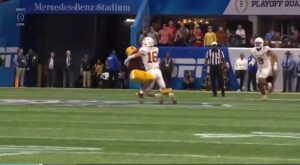Peach Bowl: College football to launch investigation into key targeting call following brutal hit in Texas-Arizona State CFP game
College football fans and analysts are furious after a controversial no-call on a targeting penalty during Texas’ dramatic win over Arizona State in the Peach Bowl, a College Football Playoff quarterfinal. The incident occurred late in the game when Arizona State quarterback Sam Leavitt completed a pass to wide receiver Melquan Stovall. As Stovall made the catch, Texas defensive back Michael Taaffe led with the crown of his helmet and collided with Stovall’s helmet to tackle him.
Stovall was left in pain on the ground, prompting officials to review the play for a potential targeting penalty. According to the rules, targeting is called when a player initiates forcible contact by leading with the crown of the helmet or makes contact with the head or neck of a defenseless opponent. In this case, Taaffe’s hit seemed to meet both conditions, yet after reviewing the play, the officials determined that it was not targeting, causing an uproar among fans, analysts, and former players.

Former NFL wide receiver Terrell Owens expressed his disbelief on social media, tweeting that the play was a “textbook targeting” that was somehow overturned by the review booth. Others, like NBC Sports’ Nicole Auerbach and ESPN’s Booger McFarland, also voiced frustration, with McFarland stating, “If that’s not targeting do away with the rule.” CBS Sports’ Danny Kanell joined in, remarking that the ruling seemed to be in favor of Texas. Barstool Sports president Dave Portnoy criticized the decision, claiming that if targeting is going to remain a rule, such obvious violations shouldn’t be ignored. NFL RedZone host Scott Hanson and former NFL referee Terry McAulay also weighed in, agreeing that it was a clear targeting violation.

The decision not to call targeting had significant implications for the game. Arizona State was forced to punt, giving Texas a chance to win. The Longhorns drove into field goal range, but kicker Bert Auburn missed a 38-yard attempt, sending the game into overtime. Arizona State initially took the lead in overtime with a touchdown from running back Cam Skattebo, but Texas quickly responded with a touchdown of their own, forcing a second overtime. In the second overtime, Texas scored again and converted a two-point attempt to go up 39-31.
Arizona State needed a touchdown to keep the game alive, but Leavitt threw an interception, sealing the victory for Texas. Despite Arizona State’s impressive comeback, including Skattebo’s 143 yards and two touchdowns, the Longhorns advanced to the semifinals. Texas will now face the winner of the Rose Bowl between Oregon and Ohio State for a chance to compete in the National Championship.
In the wake of the game, the controversy surrounding the targeting call has prompted college football officials to launch an investigation into the decision. Fans and analysts are hoping for a thorough review of the incident to address the concerns surrounding the ruling.



No Comment! Be the first one.